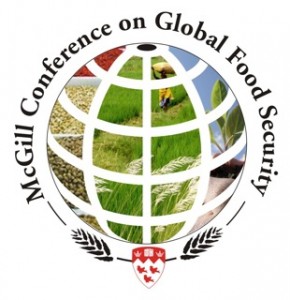The world’s leading food experts, as well as representatives of the countries who need their expertise the most, will return to McGill in the fall—and not a moment too soon.
The second annual McGill Conference on Global Food Security will take place Oct. 5-7, 2009. Last September, inspired by the devastating spike in food prices that triggered rioting around the world, McGill hosted some 360 participants from 17 countries at the inaugural food conference.
That first event was a tremendous success, but so much more remains to be done, especially considering the devastating impact on the world’s hungry that the global economic crisis continues to have. In the past year, approximately 100 million people have been added to the ranks of the roughly 1 billion people worldwide considered by the United Nations Food and Agricultural Organization (FAO) to be undernourished, according to its report issued on June 19. Meanwhile, the average food prices in many parts of the developing world remain as much as 24 per cent higher than they were in 2006, the FAO reported.
This year’s conference, which draws on leading experts from around the world on various aspects of food supply and production, is focused on questions related to the effect the economic crisis has had on food supplies and prices and what can be done to alleviate nutrition problems that are particularly acute in the developing world, although not uncommon in the developed world.
“We know the economic downturn has punished the developing world in particular,” said Chandra Madramootoo, Dean of Agricultural and Environmental Sciences and the driving force behind the conference. “While we in the West have seen some decreases in commodity prices, that hasn’t resulted in lower food prices in other parts of the world. On top of that, there have been far-reaching effects on nutrition as people have lost jobs or had income reduced and can no longer afford a balanced diet.”
Topics on the preliminary conference program include: food security in a challenging economic environment, the effects of the global recession, access to farm credit, the investments needed for agricultural development and the response of international agencies to challenges of food security. As well, conference participants will examine the effects of climate change, markets and trade, and biofuels.
Representatives of developing and emerging economy countries attending the conference will come from Ethiopia, Guatemala, Brazil, Russia, India, China, Guyana, Haiti, Indonesia, Kenya, Mexico and Vietnam. They will speak on their specific country experiences and the effects of the financial crisis on food supplies.
They will be joined by officials from a wide range of international agencies devoted to food issues, including the World Bank, the United Nations, the Canadian International Development Agency, the United Nations World Food Program, the International Food Policy Research Institute and the Smithsonian Environmental Research Center, as well as leading academics from McGill and other universities.
The conference, which is open to the public, takes place at New Residence Hall, 3625 Avenue du Parc, in Montreal.
For more information on the conference, please visit: http://www.mcgill.ca/globalfoodsecurity/
For more information on the FAO report, please visit: http://www.fao.org/news/story/en/item/20568/icode/

